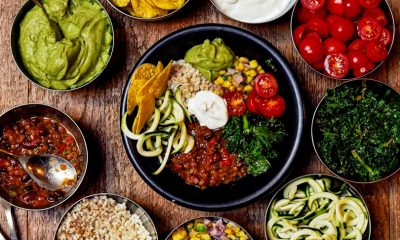Nutrition
Easy ways to eat more plants this year
Rather than follow strict rules, simply add plant foods like fruits, vegetables, nuts, beans and grains to more meals throughout the day.

Plant-forward eating should be easy and delicious – and it can be. Rather than follow strict rules, simply add plant foods like fruits, vegetables, nuts, beans and grains to more meals throughout the day.
Walnuts, for example, are a kitchen multi-tasker with uses well beyond baked goods. In fact, walnuts can be used as a simple, whole-food meat alternative. One ounce of walnuts contains important nutrients including 4 grams of protein, 2 grams of fiber, 2.5 grams of monounsaturated fat, 13 grams of polyunsaturated fat and 2.5 grams of essential omega-3 alpha-linolenic acid.
Try walnuts as an alternative to meat in recipes like Walnut Meatless Meatballs or Pizza with Plant-Based Walnut Crumble, and find more plant-forward recipes at walnuts.org/plantrecipes.
Walnut Meatless Meatballs
Total time: 42 minutes
Servings: 4
| 1 | tablespoon olive oil |
| 1/4 | cup minced onion |
| 1 | teaspoon minced garlic |
| 1 | tablespoon tomato paste |
| 1/2 | cup California Walnuts, chopped |
| 1/4 | cup cooked brown rice |
| 1/4 | cup chopped roasted red peppers |
| 1/4 | cup panko breadcrumbs |
| 1/4 | cup Parmesan cheese |
| 1 | tablespoon Italian seasoning |
| 2 | tablespoons chopped Italian parsley |
| 1 | egg, beaten |
Preheat oven to 375 F and line baking sheet with parchment paper.
In small skillet over medium heat, heat oil. Add onion and garlic; saute 1 minute. Add tomato paste and cook 1 minute. Transfer to food processor with walnuts, rice, roasted red peppers, breadcrumbs, Parmesan, Italian seasoning, parsley and egg. Pulse until combined but not mushy.
Form into eight equal balls and place on prepared baking sheet. Cook 12 minutes, or until firm to touch. Serve with sauce of choice.
Pizza with Plant-Based Walnut Crumble
Total time: 38 minutes
Servings: 4
Walnut Sausage Crumble:
| 1 | cup California Walnuts |
| 1/2 | cup cannellini beans, rinsed and drained |
| 1 | tablespoon coconut aminos |
| 1 | tablespoon olive oil |
| 2 | teaspoons fennel seeds |
| 2 | teaspoons Italian seasoning |
| 1 | teaspoon onion powder |
| 1 | teaspoon garlic powder |
| 1 | teaspoon smoked paprika |
| 1/4 | teaspoon celery salt |
Walnut Sausage Pizza:
| 1 | pound pizza dough |
| 6 | tablespoons pizza sauce |
| 2/3 | cup mozzarella cheese, divided |
| Walnut Sausage Crumble, divided | |
| 6 | tablespoons pesto |
| 1/4 | cup sliced small tomatoes |
| fresh basil leaves | |
| shaved Parmesan cheese |
To make Walnut Sausage Crumble: In food processor, pulse walnuts, cannellini beans, coconut aminos, olive oil, fennel seeds, seasoning, onion powder, garlic powder, paprika and salt to sausage like consistency.
To make Walnut Sausage Pizza: Preheat oven to 500 F and line two large baking sheets with parchment paper. Divide dough into four pieces and roll out into thin ovals; place on baking sheets.
Spread two dough pieces with equal amounts pizza sauce, 1/3 cup mozzarella cheese and half of Walnut Sausage Crumble.
Spread remaining dough pieces with pesto, remaining cheese, remaining Walnut Sausage Crumble and tomatoes.
Bake 8 minutes, or until pizza edges are golden brown. Garnish with basil leaves and shaved Parmesan.
Nutrition
Eat your greens and skip the sugar spikes
Cruciferous vegetables like broccoli and kale could help with the management of blood sugar levels, particularly for people at risk of type 2 diabetes and cardiovascular disease (CVD).

New research by Edith Cowan University (ECU) has found evidence that cruciferous vegetables like broccoli and kale could help with the management of blood sugar levels, particularly for people at risk of type 2 diabetes and cardiovascular disease (CVD).
PhD student Ms Emma Connolly investigated whether cruciferous vegetable intake improved glycaemic control (blood sugar control) compared to root and squash vegetables in non-diabetic adults with elevated blood pressure.
In a randomised, controlled, crossover trial, participants consumed four serves per day of either cruciferous vegetables (broccoli, cabbage, cauliflower, kale) or root and squash vegetables (carrot, potato, pumpkin, sweet potato) with lunch and dinner meals for two weeks.
“Our participants wore glucose monitors throughout the study, so that we were able to measure blood sugar levels continuously throughout each two-week period,” Ms Connolly said.
“We found that, when participants consumed the cruciferous vegetables, they had less variable blood sugar levels compared to when they consumed the root and squash vegetables. We also noted that these participants had a smaller spike in sugar levels after the meals. A central goal of blood sugar control, particularly for people with diabetes, is to smooth out spikes and reduce variability in blood sugar levels throughout the day. Stable blood sugar, with minimal peaks and less fluctuations is associated with better overall health and wellbeing.”
Ms Connolly said further research is essential to fully understand the underlying mechanisms driving these findings, as well as to explore the broader clinical implications.
“Continued investigation will be crucial to determine how these vegetables can be effectively incorporated into dietary recommendations for improved blood sugar regulation and overall health management,” she said.
Poor glycaemic control is estimated to occur in 541 million individuals worldwide. Ms Connolly noted that dysregulated glucose control increases the risk of type 2 diabetes and subsequent CVD and has a substantial societal impact.
The total cost attributed to type 2 diabetes with CVD is projected to exceed AUD$18.7 billion in Australia alone by 2031.
“Less than 1 in 15 Australian adults meet vegetable intake recommendations. Even more concerning is that cruciferous vegetables are among the least consumed vegetables. Adding vegetables like broccoli, kale, bok choy, gai lan, and cabbage to your meals most days could make a big difference to your health,” Dr Lauren Blekkenhorst said.
Nutrition
Protein-packed sweet treats
These days, sticking to your wellness goals doesn’t have to mean missing out on delicious, sweet treats.

Beach vacations, backyard barbecues and long road trips make summer a season of spontaneity. Often cited as memory-making moments, these unplanned adventures can also make it a challenge to stay on track with your health. These days, sticking to your wellness goals doesn’t have to mean missing out on delicious, sweet treats.
When summer throws you off your routine, reach for convenient sources of high-quality protein, like Premier Protein High Protein Shakes. With 30 grams of protein, 160 calories and 1 gram of sugar, you don’t have to choose between summer fun and nutrition. These summer shakes bring joy back to the health journey as easy and delicious grab-and-go solutions, putting a healthier, happier lifestyle within reach. Not to mention the shake’s 24 vitamins and minerals, including vitamins C and E, which help support a healthy immune system as part of a healthy diet and lifestyle.
The fan-favorite shakes are best enjoyed as part of a nourishing breakfast, afternoon snack, post-workout boost or as an ingredient in a protein-packed recipe. There’s something for every taste bud, with more than 12 flavors including fan-favorites Chocolate, Vanilla, Caramel and Cafe Latte. If you’re interested in trying summertime recipes that taste indulgent and pack a protein punch, consider these tasty treats.
When the sun is beating down and the only reprieve is an ice cold refreshment, let this twist on frosted lemonade be your escape from the heat. With fruity flavor and added protein, Frosted Peach Lemonade allows you to travel to a tropical island from the comfort of home.
From hot days to cool nights, Premier Protein delivers the perfect solution for the classic bonfire indulgence with Protein Marshmallow S’mores. Your new summer classic, this unexpected s’more hack lets you embrace a sticky treat without sacrificing your nutritional goals.
With nutrition that works for you, delicious recipes and nutrition tools help make the ride smoother and more enjoyable as a fun reminder the health journey doesn’t have to be daunting. With easy-to-understand nutritionals, Premier Protein High Protein Shakes deliver tasty fuel for whatever comes next, giving you the confidence to reach your goals and be the best version of yourself without missing summer’s special moments.
To find more information and protein-packed recipes that’ll help keep your summer health goals on track, visit PremierProtein.com.
Frosted Peach Lemonade
2 scoops Premier Protein Vanilla Milkshake 100% Whey Protein Powder
1 cup lemonade
1 cup frozen peach slices
In blender, blend protein powder, lemonade and frozen peach slices until smooth.
Protein Marshmallow S’mores
2 cups Premier Protein Vanilla High Protein Shake
5 tablespoons gelatin
3 scoops Premier Protein Vanilla Milkshake 100% Whey Protein Powder
3 graham crackers
3 chocolate bars
Add protein shake to small saucepan and layer gelatin on top. Let set 5-10 minutes (gelatin will start to “bloom”).
Over low heat, whisk mixture periodically until consistency thins.
Pour into mixing bowl and allow to cool 5-10 minutes until mixture is warm, not hot.
Add protein powder; whisk 10-20 minutes, or until light and fluffy. Mixture should not break and fall immediately when whisk is lifted.
Pour mixture into lined pan and allow to set in refrigerator.
Slice and serve alone or with graham crackers and chocolate bars.
Nutrition
Power your summer with 100% orange juice
Consider these unexpected ways Florida Orange Juice can help power your day.

Whether you’re lounging by the pool or hitting the trails for a family hike or bike ride, exposure to summer heat can leave you feeling dehydrated and fatigued.
Comprised of nearly 90% water and delivering essential electrolytes like potassium and magnesium, 100% orange juice can serve as a healthy complement to your hydration routine. These electrolytes are crucial in helping to maintain fluid balance and muscle function regardless of the time of year, but they’re especially important during the warmer summer months when you are exerting more.
Consider these unexpected ways Florida Orange Juice can help power your day.
Support Immunity
100% orange juice isn’t just a tasty drink; it’s also packed with essential nutrients that support your immune system. An 8-ounce glass of 100% orange juice is an excellent source of vitamin C, plus it provides key nutrients such as folate, potassium and thiamin, as well as vitamin D and calcium (in fortified juices), that help support the immune system all year long.
Add Healthy Flavor to Meals
Fat-free, cholesterol-free and sodium-free with no added sugar, 100% orange juice is a healthy addition to any diet, adding a burst of flavor to favorite dishes. Consider using Florida Orange Juice as part of the marinade in these Orange Juice Citrus Chicken Kebabs or as a base for salad dressings to create a perfect balance that will delight your taste buds.
Electrolyte and Hydration Support
With many kids participating in summer sports and other outdoor demands on families during the warmer months, it can be difficult to provide your family with healthy, hydrating beverages. However, an option like this On-the-Go Orange Juice Sports Drink helps to replenish carbohydrates and electrolytes during and after physical activity, such as running, biking, exercising or playing sports.
Find more nutritious and delicious recipes to keep your family energized during summer activities at FloridaJuice.com.
Orange Juice Citrus Chicken Kebabs
Recipe courtesy of Aaron Himrod on behalf of the Florida Department of Citrus
Servings: 8 (2 kebabs per serving)
1 large Florida Orange, zest only
1 lime, zest only
1/2 teaspoon ground thyme
2 tablespoons vegetable oil
1/4 teaspoon granulated garlic
1 teaspoon salt
white pepper, to taste
1 cup Florida Orange Juice
1 cup lemon-lime soda
2 pounds chicken tenders
8 wooden skewers
To make marinade: In medium mixing bowl, combine orange zest; lime zest; thyme; oil; garlic; salt; white pepper, to taste; orange juice; and soda.
Add chicken and completely coat with marinade. Cover bowl and place in refrigerator at least 1 hour.
Soak wooden skewers in water 20-30 minutes.
To make kebabs: Remove chicken from fridge and lace through each skewer using weaving motion. Repeat for all chicken tenders and set aside.
When skewers are prepared, drizzle extra marinade over chicken.
Heat grill to medium. Place chicken on grill. Cover and cook 3 minutes per side, or until center of meat reaches internal temperature of 170 F.
Remove from grill and serve immediately, or cover with foil and serve later.
Tips: Cover kebabs with foil for at least 20 minutes after cooking to trap in flavor and juices.
Add vegetables to kebabs, if desired, to increase flavor.
On-the-Go Orange Juice Sports Drink
Recipe courtesy of the Florida Department of Citrus
Servings: 1
8 ounces Florida Orange Juice
8 ounces water
1 pinch salt
Mix orange juice and water.
Add pinch of salt.
Pour into small bottle or reusable pouch.
-

 Destinations4 weeks ago
Destinations4 weeks agoLooking for the Hollywood magic (then finding myth making) in Notting Hill in London
-

 Destinations3 weeks ago
Destinations3 weeks agoLondon has The Monument to remember the fire that destroyed the city, but failed to learn lessons from what happened
-

 Product Showcase2 weeks ago
Product Showcase2 weeks agoSix gold awards spotlight Mang Inasal’s marketing leadership at International Business Awards
-

 Nutrition2 weeks ago
Nutrition2 weeks agoEat your greens and skip the sugar spikes
-

 Destinations4 weeks ago
Destinations4 weeks agoYour idea of the ‘London Bridge’ is false… thanks to erroneous marketing pandering to our lookism
-

 Travel3 weeks ago
Travel3 weeks agoChecking the London Underground
-

 Wellness2 weeks ago
Wellness2 weeks agoRegular exercise ‘rewires’ heart-control nerves differently on left and right side, study finds
-

 NewsMakers2 weeks ago
NewsMakers2 weeks agoDistribution of fat could influence cancer risk, study suggests












